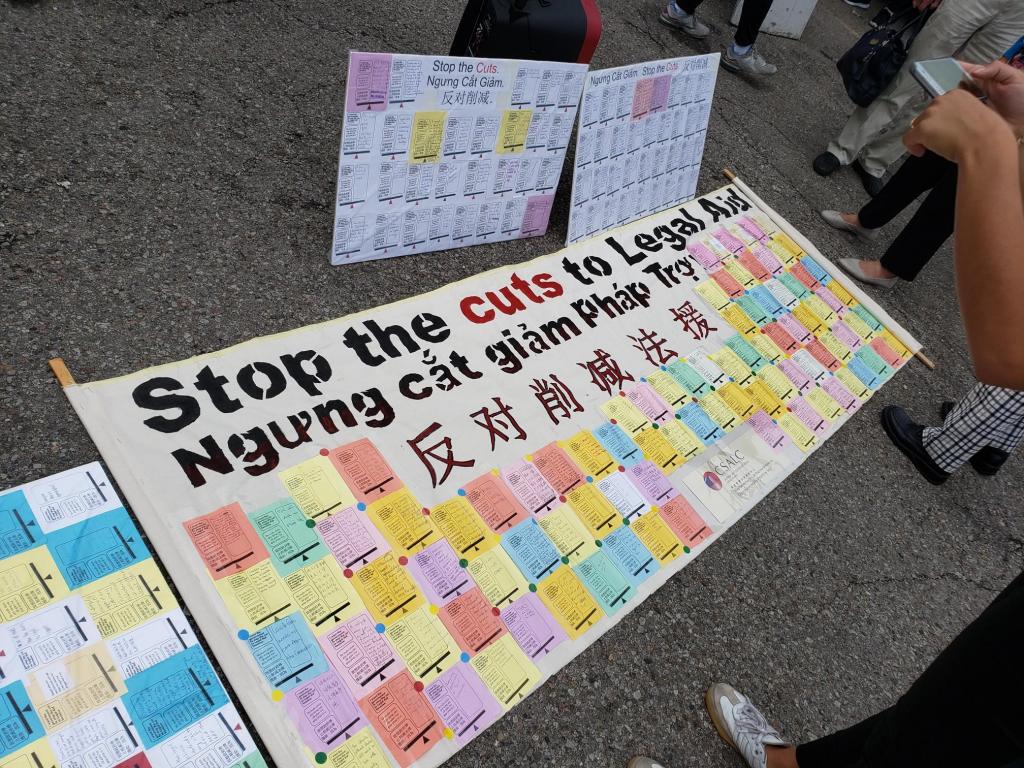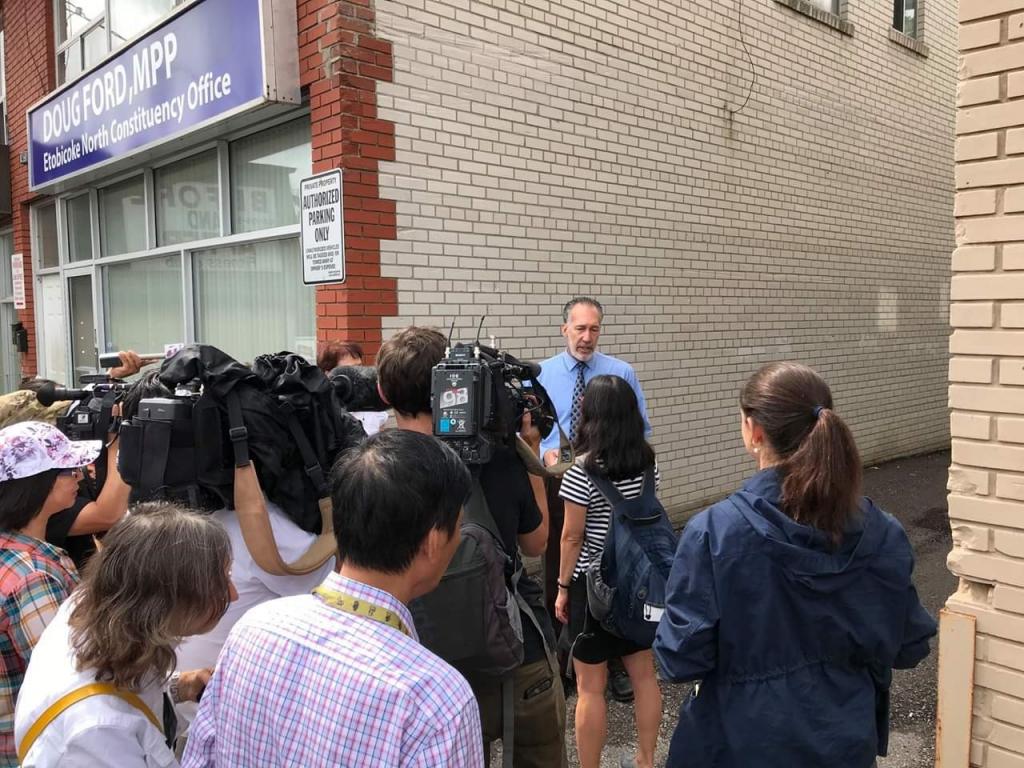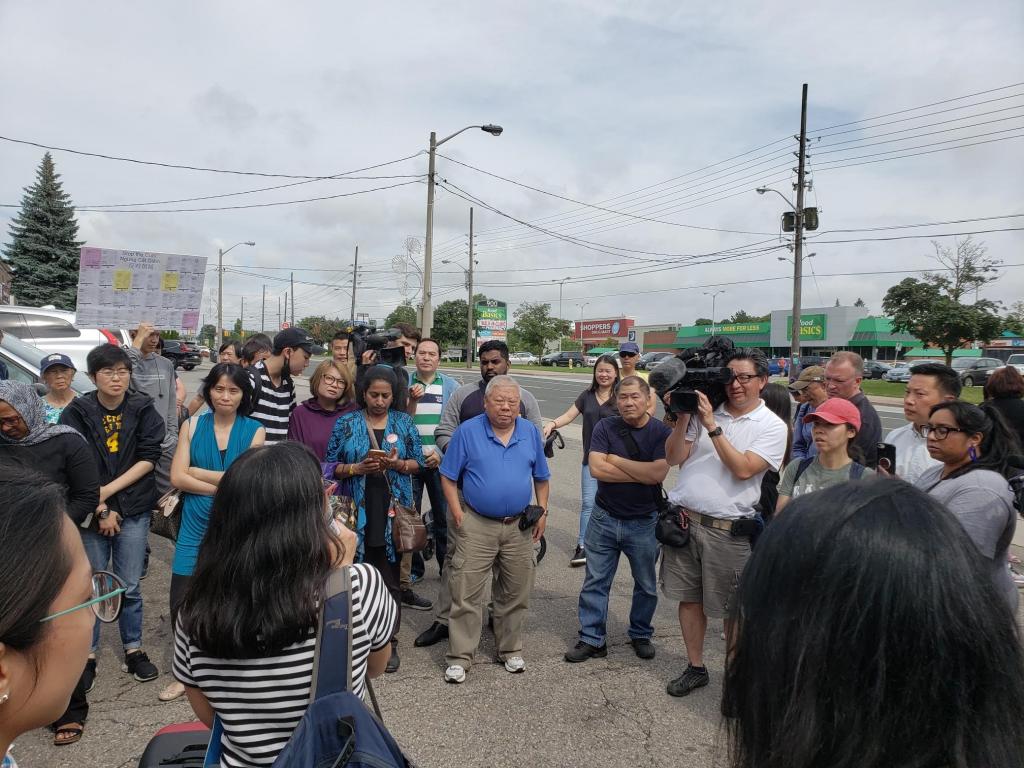Secondary menu
Ride for Justice: Marginalized Communities Push Back Against Legal Aid Cuts

By Vincent Wong and India Annamanthadoo
By the busloads they came. Women, children, elderly. Grocery store workers, nail salon workers, concerned community members, HIV survivors, and holistic health workers - primarily from the Chinese and Vietnamese communities. Our tandem from the IHRP (Research Associate Vincent Wong and Summer Fellow India Annamanthadoo) bore witness to the voices of individuals neglected and left behind by our legal system.
Dubbed the Ride for Justice, the Chinese and Southeast Asian Legal Clinic (CSALC), joined by several partner community legal clinics, and the Centre for Immigrant and Community Services (CICS), organized bus rides, petition drives and a protest in front of the constituency office of Premier Doug Ford in Etobicoke North on July 30th as one of many events in a larger Provincial Day of Action all across Ontario. The message was clear: the Ontario government's $133 million cut to provincial legal aid would hurt the most vulnerable groups in society and their community legal clinics that served them.
In a remarkable example of protest art, legal clinic clients and allies filled banners with notes in different languages, reflecting on why they wanted the government to stop and reverse cuts to legal aid. One note stated that "access to justice is a fundamental right". Another note stated that "legal rights should not be only for the rich". A third note lamented that "dial-a-doug is not the same as legal representation" - referring to the Premier's statement that anyone requiring legal aid should call his office directly to receive it.

Colourful banners were filled with notes from community members opposing the Ford administration's massive cuts to legal aid.
Avvy Go, Executive Director of CSALC, requested an audience with the Premier's staff to deliver a stack of petitions from community members in opposition to the cuts and engage in a discussion of potential solutions. However, staff members at the constituency office refused to discuss the legal aid issue with any of the individuals present, labeling them as 'protesters', and agreeing only to receive the petition letters through the back entrance of the office.

Staff at the constituency office accept delivery of the petition letters through the office's backdoor alley.
Speaking to the audience gathered, Go remarked that the government was not merely cutting legal aid funding, but also "telling clinics not to do any systemic test cases". If legal clinics were not able to engage in the work of advocacy, lobbying, and test case litigation, they would not be able to adequately address systemic issues such as racialized poverty rates which for many communities are "double and triple the number" of average poverty rates in Ontario, added Go. For instance, community legal clinics had been involved in international human rights advocacy to the UN Committee on the Elimination of Racial Discrimination in 2017, which was critical in the re-establishment of a National Anti-Racism Strategy in Canada.
Access to justice is a critical component of Canada's obligations under international human rights law. Article 2(3) of the International Covenant on Civil and Political Rights (ICCPR), to which Canada is a signatory, obliges States Parties to "ensure that any person whose rights or freedoms...are violated shall have an effective remedy" and to "ensure that any person claiming such a remedy shall have his right thereto determined by competent judicial, administrative or legislative authorities, or by any other competent authority provided for by the legal system of the State, and to develop the possibilities of judicial remedy".
The right to an effective remedy in international human rights law (and relatedly, the right to equality before the law and to the equal protection of the law) cannot be respected, protected, and fulfilled without the provision of legal aid, both civil, criminal, and administrative, to those who cannot afford it.
Yet despite this, the government was going ahead with the dismantling of Ontario's legal aid system. Shalini Konanur of the South Asian Legal Clinic of Ontario (SALCO) stated that their clinic was already seeing a "rush of calls from people who cannot find help anywhere else". These clients included those facing the dire prospects of deportation, eviction, and cutting of social assistance to afford basic, life-sustaining necessities. Ruth Goba of the Black Legal Action Centre (BLAC) pointed out the discrepancies between the Premier's statements that he is loved by the Black community with the dire impact that the government's cuts to policing oversight, education, legal aid, and social services were having on the same Black community in Ontario. In particular, Goba foregrounded the crisis in access to justice for young black accused languishing in pre-trial detention because they can no longer get legal aid certificates for bail as a result of the legal aid cuts.

Members of racialized communities share stories that demonstrate the human impacts of cuts to community clinics.
But it was clear that, despite the multitude of challenges that faced them, the overall mood of the day was hopeful. The Ride for Justice participants cheered loudly for the speakers, particularly for those clients who shared their lived experiences. On the buses, excited conversations took place in English, Mandarin, Cantonese, and Vietnamese. Many of the participants were not accustomed to taking part in rallies, petitions, and demonstrations. They were excited to know that they could be a critical part of a movement and empowered to have a say in an important political discourse that so often ignores and sidelines the voices and realities of low-income communities of colour.
One Chinese woman shared her family's story of being shocked by a landlord's eviction notice, being unable to communicate properly, and finding help to enforce her rights under the Residential Tenancies Act with the assistance of a community legal clinic. In her final request to the government to reverse the cuts, she was adamant: legal aid is ultimately about protecting human rights and human dignity.
